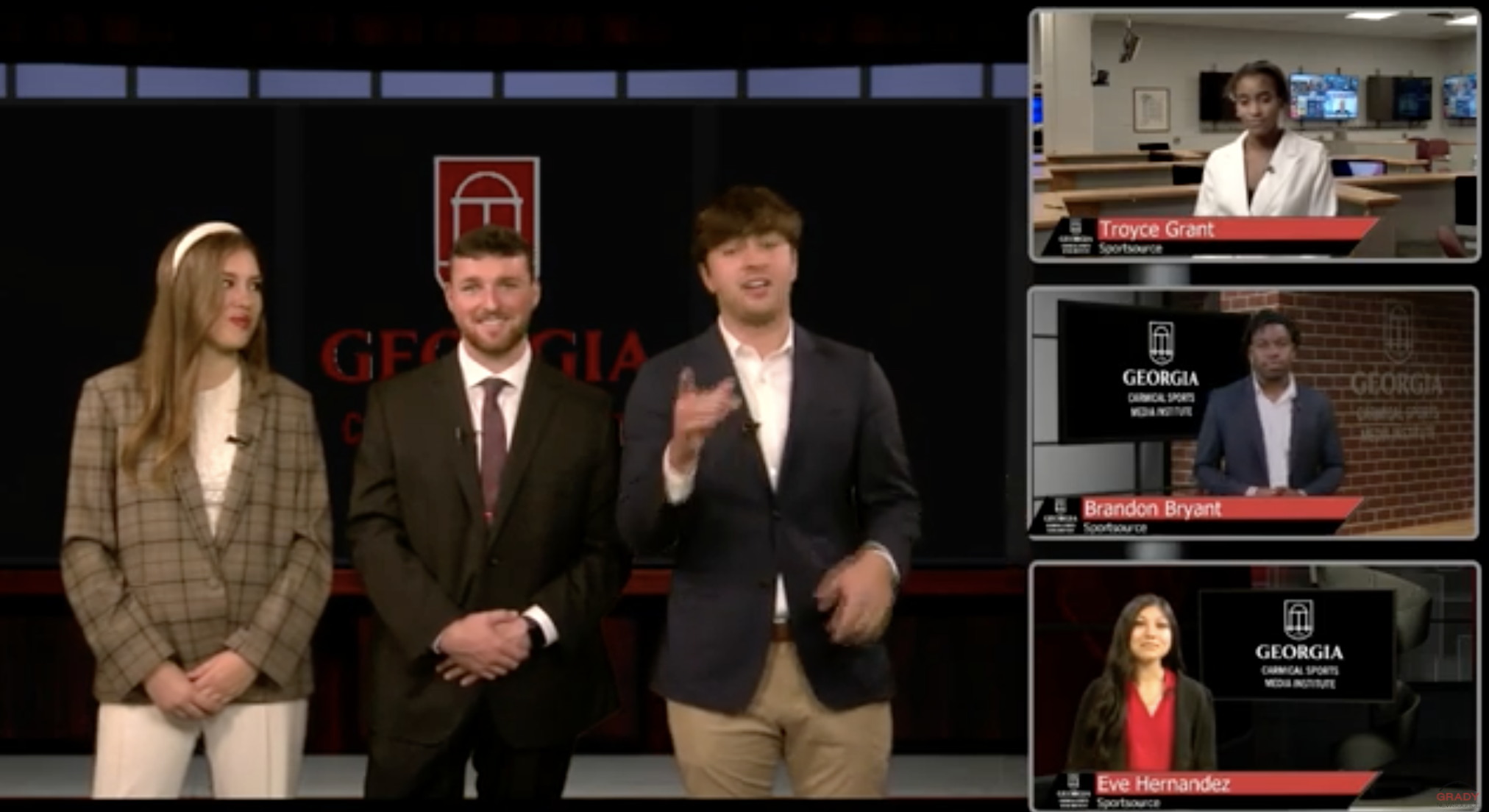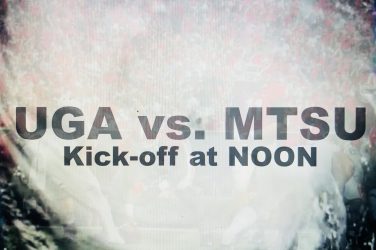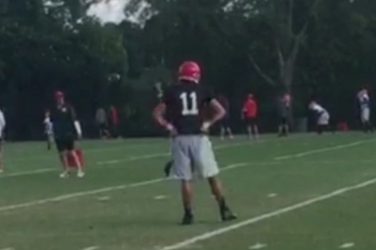High school and college athletes face unique challenges. University of Georgia students Katie Morrison and Rodrigo Blankenship bring you an inside look at those challenges and the pressures “Beyond the Lines.”
PART 1
Part 1 explores the challenges student-athletes face in two different sports: high school football and collegiate volleyball.
By Katie Morrison
By Rodrigo Blankenship
PART 2
In Part 2, University of Georgia students Katie Morrison and Rodrigo Blankenship explore what it’s like balancing school and athletics as a soccer player at both the high school and college levels.
By Katie Morrison
By Rodrigo Blankenship
PART 3
In Part 3, Katie Morrison and Rodrigo Blankenship take an inside look at the lifestyles of baseball players and the challenges they face at the high school and college levels.
By Katie Morrison
By Rodrigo Blankenship
PART 4
For the final section of this series, Katie Morrison and Rodrigo Blankenship took a step back and examined Rodrigo’s day to day experience as a high profile athlete at the University of Georgia. The story below includes a video of “a day in the life” of Rodrigo Blankenship, outlines his busy schedule, and even includes Katie’s perspective having worked with him in the classroom.
By Katie Morrison, featuring Rodrigo Blankenship
Group work. Two words that many students find completely disheartening, because typically one or two students will end up carrying the weight of assignments while less proactive members take the backseat.
Now imagine this: group work with a college student athlete. But not just any college or any athlete. A football player at the renowned University of Georgia. We see them around campus, sporting their Georgia gear covered in white Nike ‘Swoosh’ logos from head to toe. If you have one in your classroom, their presence is instantly known.
From an average student’s perspective – the outsiders looking in – we’d be lying to ourselves if we didn’t admit we have some preconceived notions about these guys. “They’re privileged.” “They don’t care about academics as much as we do.” “They’re just here because they can play football.”
More than three months ago, I found myself paired with University of Georgia kicker Rodrigo Blankenship to complete a series of community reports in our journalism capstone course. I’ll admit, I was initially less than optimistic and had my share of assumptions. I’d seen him before in some of my larger lecture classes. He seemed to regularly take notes on his “Georgia red” MacBook and participate in class discussions. Regardless, I figured he was going to play the “I’m-too-busy-with-football” card any chance he got.
UGA football players say they have these really crazy, busy schedules. I didn’t realize just how true their claims were until I was working with one, trying to find a window of time that actually worked for both of us to hash out our stories.
In addition to being a student I also work a part-time job, which only made determining our common availability even more difficult. Nonetheless, Rodrigo and I worked together to execute our assignments. I can remember one morning where we found ourselves meeting at sunrise, getting our work done before the rest of the day even started.
That morning, Rodrigo arrived camera ready but with tired eyes, likely the result of lack of sleep from the night before. He wore a crisp, plaid button-down shirt paired with dark blue dress pants and a pair of loafers. While this attire was perfect for our assignment that morning, Rodrigo brought more casual clothes with him to change into afterwards that would be more appropriate for the rest of his day.
Check out the Instagram story below of a typical Tuesday/Thursday in Rodrigo’s life this semester:
https://youtu.be/yTyRmB6jr6w
If you didn’t catch Rodrigo’s schedule above, here’s a breakdown:
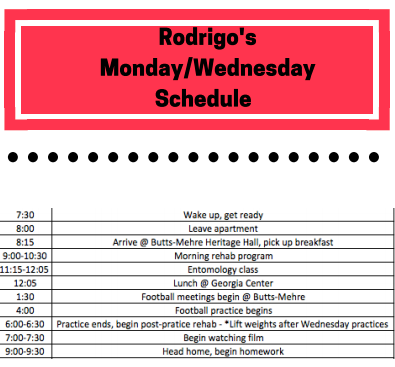
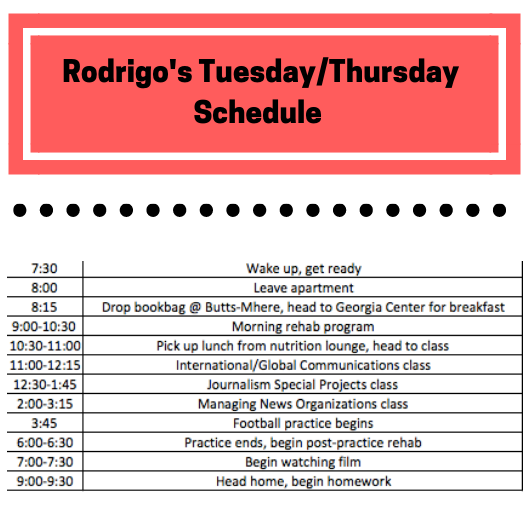
Clearly, there’s not much time in his day allotted for anything other than what has already been planned out. As the semester and our assignments progressed, I became more aware of his schedule and time constraints. But it wasn’t until I followed him around to help film “a day in the life” that I really understood just how hectic his days are.
“When does he get his other school work done?” “How much sleep is this guy getting each night?” “Does he even have a social life?” These were just a few of my thoughts after I learned what a typical day is like for him.
With such a chaotic schedule, it’s no surprise that student-athletes like Rodrigo may find themselves feeling discouraged at times. Rodrigo received expert advice from a sports psychologist, Dr. Drew Brannon, about the pressures of being a student-athlete and how to handle them. A former college basketball player at Presbyterian College, Dr. Brannon is all too familiar with the lifestyle of student-athletes.
According to Dr. Brannon, there are two main keys for success for student-athletes: gratitude and short-term focus. He explained to Rodrigo the importance of taking a step back in life. “Recognize the things that are there to be grateful for,” said Brannon. “It’s really easy to lose sight of that, I think there are a lot of D1 student athletes who, because of their stress, forget that they’ve got a fantastic opportunity to play a sport and get a great education, and that people care about them, and that those are just tremendous things.”
Dr. Brannon also recommends that student-athletes try to simply focus on 24 hour periods. “Let’s understand what the habits need to be, and what the behaviors need to be, and what the mindset needs to be, and then let’s just try to do everything we can to have a great 24 hours.”
After hearing this expert advice, I sat down with Rodrigo to get a first-hand understanding of what being a student-athlete at a premier university is really like.
Check out the Q&A with Rodrigo Blankenship below for more information on what it’s like balancing athletics and academics from his perspective.
Q: With such a busy schedule, how do you stay on top of everything?
“It feels like almost every minute of your day is planned out for you. Sometimes you don’t even get time to stop and think about what you’re doing. You just kind of get in a routine. It’s a little monotonous. Sometimes you don’t want to do the things you really need to do. I’ve been a college athlete for four years, and that puts a lot of miles on your body. I have to do the things that I have to do to keep my body in the best health that it can possibly be in to go out and perform on Saturdays. You don’t want to stay up until midnight or later than that to do all of your work, but sometimes you’ve just gotta do what you’ve gotta do. You have to put your head down and just knock it out. You get to Saturdays and it’s really rewarding to see that the work you put in during the week pays off.”
Q: How did being placed on scholarship impact your experience as a student-athlete?
“Work ethic for me really didn’t change. I knew that I wanted to do whatever I could to contribute to the team so nothing has really changed for me as far as that goes. But I do definitely think that having that financial burden lifted can help with not only stress that you may be feeling, but also stress that your family might be feeling. Often times you’re not the one paying for it – it’s your family that’s paying for it. Some guys do find ways to take on income so that they can help with that payment, but it definitely can help take a lot of stress off of yourself and off of your family.”
Q: Do you ever have those moments where you say, “I can’t”?
“Two seasons ago – 2016, I was not the starting field goal kicker to start the season. There came a point early on in that season where I was not very happy playing football, and I didn’t know that I was going to continue playing at the end of that season. But I just tried to keep grinding, and tried to keep working every single day just hoping that if you continue to work hard and you continue to do the right things and do them for the right reasons that eventually it’s going to pay off for you. Eventually, there came a point in that season where I was given an opportunity to be the starting placekicker, and that was the moment that I just had to hold on to faith for, that that opportunity was going to come and that I was going to be able to take advantage of it and contribute to the team.”
Q: What’s the best advice you’ve received about succeeding in sports and in school?
“I think the best advice I’ve been given was just to appreciate what you have and appreciate where you are. There’s countless students around this country that would give anything just to go to college, and there’s also countless athletes around the country that would give anything to play in college. So I think that just taking the time to step back and appreciate that you’re going to one of the best schools in the country and that you have an opportunity to play for one of the best teams in the country. I think that goes a long way to keep you in perspective and to just make sure you don’t lose sight of the fact that you’re incredibly blessed to be in the position that you’re in.”
Q: What role do your coaches play in motivating you and keeping you on track?
“I think we have the best coaching staff in the country. Our coaches do everything they can to make sure we’re as prepared as possible every week to succeed in the classroom and on the football field. We come at the beginning of every week and they have a game plan ready for us, so as long as we’re wholeheartedly committed and dedicated to that game plan every week we can go out and prepare in whatever ways we need to to have success on Saturday. The coaches get academic reports from us every week about how we’re doing in the classroom. They’ll set aside time to make sure we’re going over to Rankin – the academic center – to make sure that we catch up on our work if we’re behind, and to just stay on top of things even if we’re doing well. They place a really high priority on making sure we spend time at Rankin. We spend time with mentors during study hall. We spend time with tutors for classes. They really harp on making sure you’re responsible about your studies, you’re on time for your academic obligations, and that you show respect for the tutors and counselors over there as you would show respect for your coach and your professor. I think our coaches do a tremendous job of letting us know how important academics are to them. That’s half the battle. At the end of the day you come to a university to get an education.”
Q: You’re graduating in December. How does it feel to reach that point, and what’s next?
“I am graduating in December, and I think a big part of that was the fact that I came in and had a lot of hours already done from taking several AP classes when I was in high school, so that helped me get a head start. And also we take classes every summer to try to stay a little bit ahead of the curve. I’m very fortunate to get my education from UGA. It’s one of the best programs in the country. It’s got one of the most renowned journalism schools in the entire country, so it’s been a huge blessing for me to be here and to have the opportunity to get my education from the school – from Grady. I’m not entirely sure what the next step looks like right now. If I’m going to start with a graduate program I know I’ll need to explore my options. I’m not entirely sure what my future looks like right now, but at the end of the season I’ll sit down with my parents and my coaches and we’ll decide what the best plan of action is for me.”








